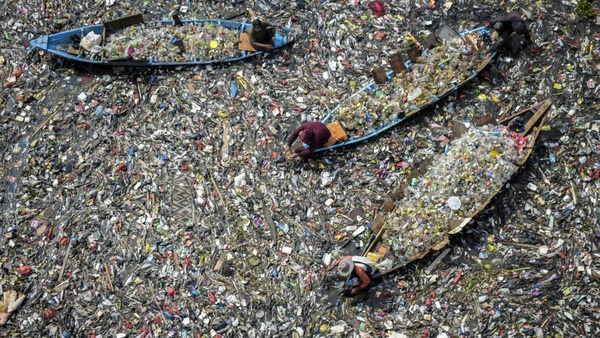Geneva - Saba:
Representatives from some 180 countries are meeting in Geneva on Tuesday in a renewed attempt to reach a global treaty to curb plastic pollution. Hopes for an ambitious agreement are fading due to pressure from oil-producing nations and disagreements over production and financing.
In light of escalating geopolitical and trade tensions, this ten-day round of intergovernmental negotiations (CIN5-2) was added after talks in Busan, South Korea, failed in December. A group of oil-producing countries prevented any progress.
The stakes are high: If action is not taken, global plastic consumption will triple by 2060, according to projections from the Organization for Economic Cooperation and Development.
Plastic waste in soil and waterways, from mountaintops to oceans, is expected to increase by 50% by 2040, according to the United Nations Environment Programme (UNEP), which is holding the secretariat for the UN negotiations. The planet currently produces 460 million tons of plastic annually, half of which is destined for single-use, while less than 10% of plastic waste is recycled.
Recent studies have shown that polymers, when they break down into micro- and nanoplastic particles, pollute ecosystems and enter human blood circulation and organs.
A team of 450 scientists from 65 countries monitoring the talks criticized the still-unknown repercussions on the health of current and future generations.
A source familiar with the talks said the United States is seeking to limit the scope of the treaty to post-production issues such as waste disposal, recycling, and product design.
This comes as the Trump administration is reversing its environmental policies, including its long-standing conclusion that greenhouse gas emissions threaten health.
"No one wants a further extension of the negotiations," said Björn Piller, director of the Sweden-based NGO network Ipen. "It is possible that the structure of a treaty will emerge from the discussions, even if it lacks funding, courage, or spirit." A diplomatic source, speaking on condition of anonymity, noted that "the context is difficult because we cannot completely ignore what is happening elsewhere in terms of multilateralism, and thus the new role of the United States or the BRICS group" led by China and Russia.
The source noted that "these issues are of great interest to developing countries," either because they are plastic producers and risk a significant economic impact if the treaty is adopted, or because they suffer from plastic pollution and demand accountability.
At the UN Ocean Conference in Nice in June, 96 countries called for an ambitious treaty that includes a goal to reduce plastic production and consumption.
More than 1,000 delegates, including scientists and petrochemical industry lobbyists, will attend the talks, raising concerns among supporters of the ambitious agreement that the industry's influence could lead to a watered-down agreement focused on waste management rather than imposing production restrictions.
The petrochemical industry said it continues to support a global treaty and is urging the US administration and Congress to "engage" in the negotiations.

| more of (International) |




